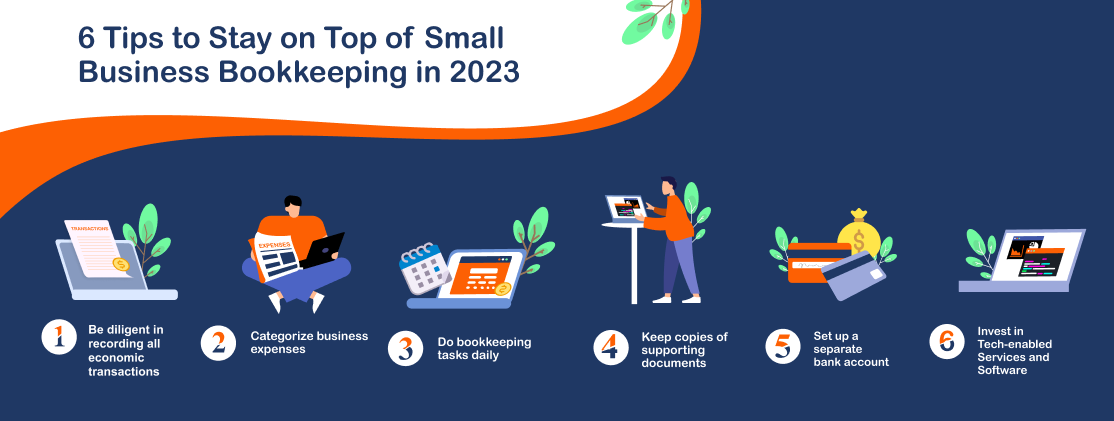
By Maric De Castro
February 16, 2023 | 1:46 am
Table of Contents
Do you have a good grasp of your business’s financial health? Small business bookkeeping
plays a vital part in successfully running a business.
Money in the bank may mean something other than your business is doing well. There could be
expenses or payables not recorded in the books.
Bookkeeping is a record-keeping system that reflects the business’ financial activities. It
tracks how much money is coming in versus what is going out from the business coffers.
A small business bookkeeper keeps a journal book that records all debits and credits -
transactions that bring in money and expenses incurred. These entries are classified into
specific ledgers to generate accurate financial statements.
The financial statements - income statement, balance sheet, and cash flow statement - give a
snapshot of the business’s robustness and determine if you have enough money to keep the
company afloat. All of these reports will only be available with proper and timely
bookkeeping.
Why is up-to-date bookkeeping essential?
How do you truly know if your small business is profitable if there is no regular tracking
of business activities?
Creating and maintaining up-to-date financial records is essential for small business owners
as it provides easily accessible valuable financial data. This data is critical to the
survival and, ultimately, the success of your business.
Bookkeeping consists of the following:
Ensure proper bookkeeping entries to come up with accurate FS. FS are vital to make sound
business decisions - in scaling the business, if you have the right financial support, or if
fundraising is necessary.
Often, doing bookkeeping is set aside until one has the time. Before you know it, it's
month's end, and the books have to be closed.
In addition, staying on top of bookkeeping prevents the risk of fraud. With well-placed
policies and procedures, this establishes internal controls - counter checking of
transactions and accountability.
Best Bookkeeping Practices
Here are the ways to ensure up-to-date books, whether bookkeeping is done on your own or by someone else:

1. Be diligent in recording all economic transactions
Running a business entails payment collection for goods or services rendered. Once
collected, record the payment in the books right away.
Take note of uncollected sales to give the company an idea of unpaid invoices. Recording of
unpaid invoices helps in following up on payments from clients.
In addition, record all expenses, whether paid or unpaid. Small
businesses, depending on the
nature of business, incur different expenditures. Typical costs include marketing, payroll,
employee benefits, rent and utilities, and loan and interest payments.
The proper and complete recording of all business transactions is needed to generate an
accurate financial report. With a financial statement, small business owners have a good
picture of their business performance.
2. Categorize business expenses
Determine the everyday expenses of your business and categorize them
accordingly. Categorizing the expenses makes a reasonable basis for budget planning and
computation of taxable income.
Expenses identified and classified correctly give insight into which business activity costs
a lot and, if necessary, to continue spending on them. One may also take cost-cutting
measures when planning for the next season/ budget.
Furthermore, assessing expenses can be written off the business’s taxable income will be
easy. More tax-deductible expenses mean less tax due from the company and then plowing the
savings back into running the business.
3. Do bookkeeping tasks daily
Make it a habit to record business transactions daily, even if your day gets busy. Daily
bookkeeping facilitates easy compliance and avoids bogged-down work near due dates.
Be disciplined in this task, so only a few receipts are tackled versus a stack of documents
gathered over a long period.
Furthermore, avoid cramming during audit season. You likely need to catch up on data or
identify discrepancies in inventory, sales, and payments, which can be time-consuming.
End-of-day bank reconciliation
An essential part of daily bookkeeping tasks is bank reconciliation. Have a specific
time to
reconcile cash and receipts received before the day ends. Compare the cash account on the
general ledger with the bank statement’s ending balance to check the proper recording of all
daily transactions.
Reconciling every day establishes controls as well as accountability in your company. Bank
reconciliation helps pinpoint errors or theft as well as shortages and overages.
Differences in the cash account and bank balance may mean something other than fraudulent
transactions or errors right away. Determine what caused the discrepancy, as sometimes this
could be timing issues or fees assessed by the bank.
4. Keep copies of supporting documents
Keep all your business documents and store them in one area. Organize the supporting
documents by date, type of income, or expense.
Supporting documents back up the entries in your books and for tax return purposes. These
include the following:
The supporting document may be a small piece of paper, but having it on hand helps balance the budget. Recording by a bookkeeper ensures funds are available to pay who the business owes and purchase necessary supplies to keep the business running. All the documents used for record-keeping should be kept in a secure place to safeguard the records.
How long should you keep accounting records?
Furthermore, keep accounting records for at least
three years which is the general
prescription for BIR audit. Err on caution and keep documents even if unsure of keeping or
discarding them to back up tax or income reports later or in cases of an audit.
According to BIR RR 17 - 2013, taxpayers need to
keep a book of accounts and other
accounting records:
A small business has the option to keep invoices and documents electronically. Digitally saving documents saves the burden of maintaining physical copies.
5. Set up a separate bank account
Running a business means money comes in and out of pocket. But whose pocket is it?
Maintain a bank account for your business separate from an account for personal use.
Dedicated bank accounts for the business track and easily reconcile the business` income and
expenses.
Having a separate bank account makes your business legit and trustworthy. Suppliers feel
safe and secure as they know the company they are dealing with is legal and established.
Banks will not have it any other way
Applying for a loan for your business also requires a business account. The loan amount will
be credited to this account and debited for loan payments.
Furthermore, keeping your business finance separate helps in higher credit ratings. You
might get a lower credit score If personal expenses are mixed. The target is to have a high
credit score so that when the time arises that your business needs additional funds, your
loan application gets approved quickly.
Easier tax return monitoring
Having a separate bank account from a personal account helps determine the amount for tax
payments. Only what is due from your business will be the basis.
The business may have more expenses that are tax deductible versus personal expenses. So
this lowers your taxable income.
6. Invest in Tech-enabled Services and Software
Small business owners hire a bookkeeper who does manual recordkeeping of business transactions. Accounting software programs are also available if you have the time to learn and have sufficient knowledge to do bookkeeping on your own.
How does accounting software help?
Having accounting software streamlines the process as setting up recurring journal entries
eliminates possible data entry errors.
Accounting software also makes the preparation of FS a lot easier. There is no need to
manipulate the records on spreadsheets to develop accurate FS manually.
Furthermore, having accounting software allows synced systems to provide real-time data. The
sales and payment data from your point of sales system and bank accounts are programmed in
one software to see cash flow and balances updates easily.
There is no need to wait for monthly bank statements if you sync the bank account with the
accounting system.
However, accounting software is a considerable expense, and you need more time to learn and
knowledge to use it to be a good use of time and money. The better way to do small business
bookkeeping is through outsourcing the services.
Why do you need to outsource finance functions?
Outsourcing your finance department to a tech-enabled finance and accounting services firm
simplifies small business bookkeeping. Doing so lessens the time to learn the ropes of
bookkeeping and navigating the software as they have the know-how to do so.
More importantly, having a finance expert's services helps you
understand the numbers you
see on the books. With their knowledge and expertise, they can strategize how to keep the
business afloat.
In Conclusion
You must be on top of your business’s financial health as a small business owner. An
updated, accurate, complete book ensures well-informed decisions on running your business.
Close the books every month for easy cash management and tax compliance. But do daily
bookkeeping to help maintain up-to-date records and avoid getting inundated with a lot of
paperwork on due dates.
However, you need not have to do bookkeeping all by yourself. Outsource bookkeeping and all
finance functions to the tech-enabled services of OneCFO PH so you can focus on running and
growing your company.
With OneCFO PH, customization of the accounting setup depends on your business requirements.
On top of this, it is automated, resulting in readily available finance information anytime,
anywhere you may be.
Are you looking for cost savings and efficiency in doing small business bookkeeping? Check
out OneCFO
PH`s affordable, agile, and reliable services.
Read our disclaimer here.